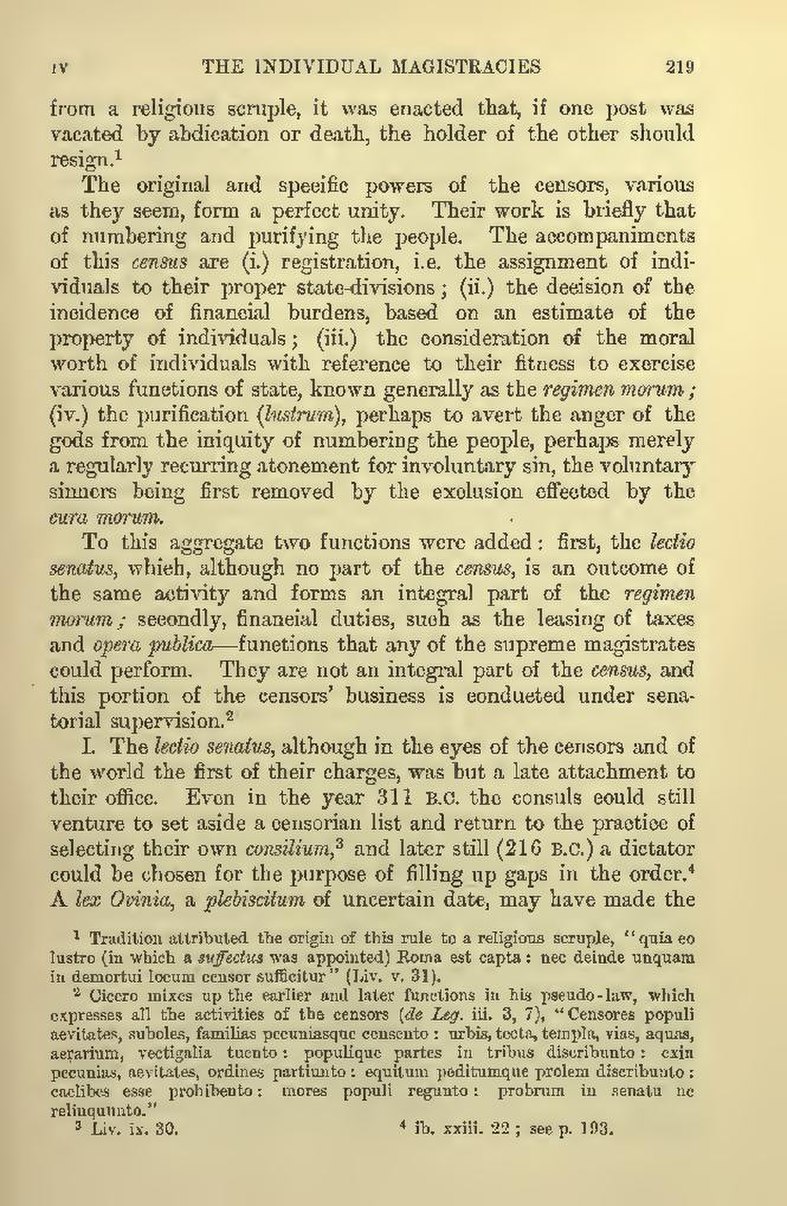from a religious scruple, it was enacted that, if one post was vacated by abdication or death, the holder of the other should resign.[1]
The original and specific powers of the censors, various as they seem, form a perfect unity. Their work is briefly that of numbering and purifying the people. The accompaniments of this census are (i.) registration, i.e. the assignment of individuals to their proper state-divisions; (ii.) the decision of the incidence of financial burdens, based on an estimate of the property of individuals; (iii.) the consideration of the moral worth of individuals with reference to their fitness to exercise various functions of state, known generally as the regimen morum; (iv.) the purification (lustrum), perhaps to avert the anger of the gods from the iniquity of numbering the people, perhaps merely a regularly recurring atonement for involuntary sin, the voluntary sinners being first removed by the exclusion effected by the cura morum.
To this aggregate two functions were added: first, the lectio senatus, which, although no part of the census, is an outcome of the same activity and forms an integral part of the regimen morum; secondly, financial duties, such as the leasing of taxes and opera publica—functions that any of the supreme magistrates could perform. They are not an integral part of the census, and this portion of the censors' business is conducted under senatorial supervision.[2]
I. The lectio senatus, although in the eyes of the censors and of the world the first of their charges, was but a late attachment to their office. Even in the year 311 B.C. the consuls could still venture to set aside a censorian list and return to the practice of selecting their own consilium,[3] and later still (216 B.C.) a dictator could be chosen for the purpose of filling up gaps in the order.[4] A lex Ovinia, a plebiscitum of uncertain date, may have made the
- ↑ Tradition attributed the origin of this role to a religions scruple, "quia eo lustro (in which a suffectus was appointed) Roma est capta: nec deinde unquam in demortui locum censor sufficitur" (Liv. v. 31).
- ↑ Cicero mixes up the earlier and later functions in his pseudo-law, which expresses all the activities of the censors (de Leg. iii. 3, 7), "Censores populi aevitates, suboles, familias pecuniasque censento: urbis, tecta, templa, vias, aquas, aerarium, vectigalia tuento: populique partes in tribus discribunto: exin pecunias, aevitates, ordines partiunto: equitum peditumque prolem discribunto: caelibes esse prohibento: mores populi regunto: probrum in senatu ne relinquunto."
- ↑ Liv. ix. 30.
- ↑ ib. xxiii. 22; see p. 193.
